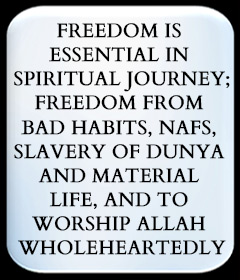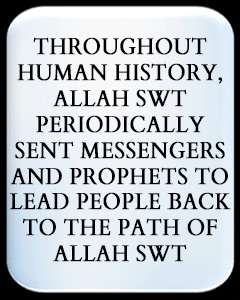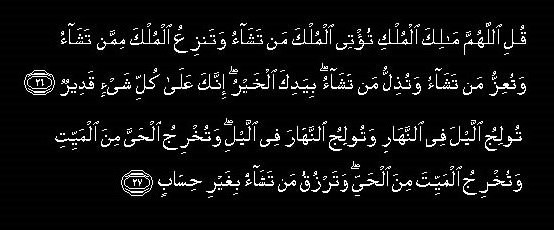|
|||||||||||

|
|||||||||||
|
|
|||||||||||
|
|
 In The Name of Allah, The Beneficent The MercifulTHE JOURNEY OF
|
||||||||||
This Brings Out A Question, Why Did Allah SWT Allow Shaitân To Exist? This life is nothing but a testing ground; based on its results we will be sent to our final abodes—paradise or hellfire. Every situation that we go through in life is to check our faith in Allah and our priorities, whether we will choose Allah’s road, or surrender to Shaitân. Calamities and difficulties in life are meant to ELEVATE you. When a person is patient at the time of trials, there is only one reward for him—jannah. Allah SWT says in the Qur’an: |
 |

Verily, Allah is with those who patiently persevere . (Al-Baqara 2:153)
Giving and taking is also a trial from Allah SWT. When He takes from us, He expects us to be patient and content with His decree. When He SWT gives us, He requires from us gratefulness to Him and to use the GIFTS FOR HIM, and that is the right way of delivering thanks to Him.
Companions of the Prophet SAW used to love when Allah SWT took from them more than when He gave them; because when Allah took something from them, they knew that they will be elevated due to their being chosen for the trial, and their patience at its onset. But when He gave, it could be a plot and plan from Allah and a person might fall into the trap by being greedy, conceited, arrogant, or any other form of ungratefulness. Companions used to spend their money for the sake of Allah as soon as possible, instead of collecting and INVESTING. Their constitution was to spend any goodness they received form Allah back on His way, and to do it quick. Women companions used to make du’a for their husbands to be accepted by Allah when they went out in His path; meaning they preferred shahadah for them as opposed to being married to them. When we give back to Allah what He has given us, it becomes a gift instead of a trial and this giving is the sign of a victorious believer.
The most important point here is not to be spiritually relaxed as relaxation is THE SIGN of a defeated individual and nation. Relaxation is to let your guard down against Shaitân; it is to surrender to the status quo of society and comfort, regardless of who we oppress in this process or whether, we ourselves get oppressed. We drop our manners, qualities, and personality just to attain the satisfaction of maintaining this status quo, to the point we reach the level of carelessness where we neither want to change anything ourselves, nor want things to change. Surrender to this relaxation and acceptance of status quo is the ultimate slavery—without any physical bounds. The chained person in jail thinks about escaping, but the one bound in invisible mental chains has no awareness of these bounds, let alone the desire of escaping. The ultimate defeat of a person is when he becomes like others and follows their lifestyle and pattern to the point he loses his own identity. At the beginning of this cycle the person is oppressed, but sooner or later this person will become an oppressor. Oppression is a vicious cycle where a person gets used to this behavior and when oppressed from one area, in turn oppresses others to remove this humiliation and frustration. Doing this, the person is not fixing the problem, rather continues the cycle of oppression by perpetrating it on other human beings.
Once we have recognized our enemy and learned to control him or in other words once we have leveled the ground and removed obstacles, we can lay down the pillars for the building. All the pillars of victory are interdependent; if one pillar is weak, the entire building is at risk of collapsing. If any pillar is lacking, it means you are not ready for victory.
Pillars of Victory:
1. Submission:
Have reality of Islam which is complete submission to Allah. This is the beginning and ending of the message of Islam. The ultimate victory is to leave this world and one is in the state of complete submission to Allah.
2. Justice:

Allah commands justice, the doing of good…(16:90)
Allah is just and He wants us to be just. Any minus in justice is a minus in Islam and vice versa. Justice is to be fair to yourself, your environment and people around you.
The more you have Islam, the more you deal with yourself and others with justice. Allah teaches us how to be just. It is up to us to find out these teachings and implement them in our lives; and this is our problem today. We don’t know how to be just in any of our dealings; neither do we make any effort to learn. Justice is the quality of our dealings in life from being on time, to personal hygiene and cleanliness; simply speaking, justice is consideration.
At the same time any negative character trait is injustice. At any of your dealings, either you are just or someone will take their rights from you. Calling someone names or spreading false information against them, having bad manners or bad attitude, being arrogant, or backbiting are all forms of injustice. Justice is opposite of oppression which is an obstacle in the path of goodness. Why should anyone face your bad manners? Why do they deserve that? When we are unjust, people look at our manners and compare Islam to it; hence we become a bad representation of Islam. Those who are unjust will pay for it in this life, in the grave, and on the Day of Judgment, meaning they will be defeated!
1. Developing Manhood/Womanhood:
The essence of manhood and womanhood is to feel a sense of responsibility and duty. When we don’t have that, instead of being the doers we become the spectators on the fence who criticize the doers and fill ourselves with pointless arguments. We have enough males and females; we need men and women with character and manners to carry the message. These people are like magnet who attract others towards them; they need to become the fathers and mothers of the Muslim Ummah….those leader who can educate and bring up the people of this nation.
2. Nutfah (Seed, dough, or the characteristic of the soul):
Nutfah is the characteristics of the human soul which are transferred through progeny. Qualities like generosity, stinginess, kindness, toughness, and temper all fall under this category. We have to respect the seed of every human being. One of the most important things to look for when one decides to marry is the seed because this is where your children are going to come from and these are the qualities that they will carry. If you have pepper seeds, can you expect to grow watermelon? It is the same with people. The seed, regardless of what you do in terms of education and environment will go back to its original trait. It is attributed to the wisdom of a righteous predecessor that he suggested spouses to choose the seed of their children properly as it is deeply rooted and once sown, cannot be uprooted and changed. Our priorities have shifted today; instead of choosing the right seed, we concern ourselves with looks, MONEY, degree and other superficialities of life. And once we have corrupted children, we wail and blame everyone for this, except ourselves.
3. Al-Horiyyah (Freedom):
Allah SWT has bestowed all human beings with freedom; they have been granted free will which allows them to choose the message of Allah unlike angels. This freedom encompasses internal, external, and the choice to be what you wish. Allah SWT says in the Quran: there is no compulsion in deen. RasulAllah SAW never forced anyone to accept his point of view, let alone the religion of Allah. We have the story of a respectable Syrian man who visited Prophet SAW in Medina and asked about the religion of Islam. Uthman (RA) was given the charge of hosting this man to the length of his stay even after he had refused to accept Islam. Upon his departure, Uthman (RA) gave this man his turban as a sign of respect and reverence. Prophet SAW passed away, followed by both Abu Bark and Umar (RA) and it was at the time of Uthman (RA) as khalifah that this man accepted Islam. He was given the freedom to choose for himself and was treated with dignity and respect that every human being deserves and its effects were seen much later on.
That is why, today when we force Islam on our children instead of educating them, once they grow up they become rebellious. We don’t give them education with freedom rather we force them to follow what we teach. We forget that Allah is the one who guides and He decides the time and place of any person’s guidance and that we have to respect this freedom of choice or rejection that Allah SWT has bestowed on humans. We will relate the story of Imam Abu Hanifa and his son who was in the path of Allah where he acquired a beautiful slave girl as war booty. He fell in love with the girl and wanted to marry her but she was a fire-worshipper and wouldn’t embrace Islam. He complained to Imam Abu Hanifa who asked his son about the whereabouts of this girl. He was informed that she was kept in a lockdown; he then asked about the kind of food she was given and so forth. He asked his son how he expected her to embrace Islam when she was stripped off her dignity and treated in such a manner. He told his son to set her free, treat her in an esteemed manner and then give her da’wah.
Our deen does not condone compulsion, spying, jail, torture, or any method that snatches the basic freedom away from people. What Islam teaches is not necessarily what Muslims do today; this only increases the responsibility of Muslims to go back to the actual teachings of Muhammad (SAW), and not follow the methods, customs, and ideologies of cultural Muslims.
 |
Freedom is essential in spiritual journey; freedom from bad habits, nafs, slavery of dunya and material life, and to worship Allah wholeheartedly. The more you are victorious, the more you are free, having no attachment in your heart and having the realization that you don’t own anything, or anybody. This internal freedom is a gift from Allah and gives you real joy and happiness regardless of material status. How can we gain this freedom? By having true humility towards Allah and other people He SWT will allow you to gain freedom and victory. |
4. Maturity:
Maturity is the ability to make right decisions at the right time. It brings stability to life which in turn allows the person to develop the above mentioned qualities. These pillars of victory are interconnected like a beaded necklace where if the thread breaks, all beads fall out one after the other.
5. ‘Aql (Thinking):
Comprehension and ability to have right kind of thinking is connected to freedom of brain and soul, and thus humility. Any mature believer who has freedom and justice will be guided by Allah to use the power of thinking properly.
6. Beneficial knowledge:
Everything in the world requires knowledge for its proper functioning but what knowledge is considered beneficial? It is the knowledge of Iman, of trusting in Allah, knowledge of Qur’an, wisdom and sunnah of Allah and His Prophet (SAW), purification of the heart; basically the knowledge that takes one closer to Allah.
All of the above mentioned qualities are dependent on hidaya (guidance) . If a person is guided by Allah, then no one can lead him astray, and whoever Allah misguides, no one can guide him. The secret of receiving Allah’s guidance is humility—with Allah and people.


Just like every other objective, the establishment of the pillars of victory also requires a journey, and this journey has its own steps. These steps are in sequence—if one is missing, the rest wouldn’t be achieved. The steps are as follows:
1. Obedience:
Obedience is the key ingredient of any accomplishment and is crucial to a person’s spiritual success. Prophet (SAW) commanded us to listen and obey. Unless a person follows the instructions and advice of someone more knowledgeable than him, he can’t reach his destination. And if one has never reached the destination himself, he cannot lead anyone else through the journey. Allah has made the Muslim nation as a source of guidance for humanity. If we as individuals are unable to successfully obey those chosen above us, how can we expect the world to obey and follow us? If we ourselves are lost, how can we guide others?
Islam places so much emphasis on obedience that during salatul-jama’ah (congregational prayer) if the imam makes a mistake, one is not allowed to leave the congregation and perform his or her own salah.
This brings us to the condition of Muslims today. We will take the example of Muslim families where abuse is a common occurrence in the name of obedience to husband, brother, and father; these are acts of foolishness and have nothing to do with the concept of obedience in Islam. If you want to be successful in life and have true internal freedom look at what Allah wants from you and do not try to philosophize situations. If you die tonight, you will be responsible for your obedience to Allah, His Prophet, your parents, and those higher than you in spiritual knowledge. There is a chain of obedience in Islam which has to continue; it is due to dismembering of this chain that Muslims have become so weak and divided.
2. Unity and Spending:
Allah SWT commands us in Qur’an:

Help ye one another in righteousness and piety (Al-Maidah 5:2)
Unity is the strength of any group, family, or nation. If you take unity away, it becomes individuality and there is nothing you can accomplish. The praiseworthy qualities that Allah SWT asks us to have will not show up until we are united; qualities like generosity, kindness, spending, and sharing are all dependent on unity.
Spending is the quality of a true believer; only a person who believes in the promises of Allah can spend without hesitation. Spending is not only of MONEY, it also includes manners, smile, good words, and kind thoughts. Abubakr (RA) has the highest status among humanity after the messengers and prophets; and it was his unconditional spending for Islam that granted him this high status. Those who don’t spend, their hearts become hard; they become selfish, greedy, and stingy. If we look at the situation of Muslims today, we can conclude that the absence of unity and spending and therefore the absence of real Iman is responsible for our current situation.
1. An-Naseehah (The Advice):
The Messenger Muhammad (SAW) said:
‘Ad deenu naseeha, ad deenu naseeha, ad deenu naseeha’ (Sahih Muslim)
– The Deen is advice, the deen is advice, the deen is advice.
When the Muslims, individual or collective, do not give advice we cannot expect Islam to rise and gain victory. Giving advice has its own fiqh, it requires wisdom, good manners, and knowledge of who to give the advice to. For example, advising mother is different from advising father, brother, or anyone else. Just like not giving advice is a problem, giving it to wrong people at wrong time also creates problem.
Naseeha has to come from the heart with humility; if it is given with arrogance, it will not have any effect on the person, in fact it will cause harm. Islam stresses the importance of consequences of the actions. Prophet SAW said: “Should you wish to act, ponder well the consequences. If good, carry on; if not, desist.” If my advice is not going to bring benefit, it is better for me not to administer it. In book Adab ad-Dunya wa Deen, the Imam mentions the quality of the fool being the one who gives advice to someone who doesn’t want it or the one who doesn’t ask for it. An arrogant person will throw the advice anyway onto others with the attitude ‘I gave it to him!’, whereas a sincere well-wisher will prepare the ground and make du’a until the person is ready to receive the advice. Today, we are in state of arrogance and rebellion, thus we neither can give nor receive advice.
2. Knowledge of giving advice with wisdom and benefit:
The thinking related to giving advice has to be done ahead of time. I have to carefully decide where, why, how, and in what tone of voice I will deliver my advice. If you take water and water the rocks with it, can you grow anything? It’s the same with advice which might be beneficial like water but you give it to wrong people and it will not produce any results.
3. Shoora (Consultation):
Today, among Muslims we have no consultation and no istikharaa. From marriage to business, every issue should start with istikharaa to Allah. This prevents the nafs from getting in the way of proper decisions. The real istikharaa should be made before the liking or personal opinions form. This should be followed by consultation with others who know about the topic or the people involved.
4. Hilm and Unaa:
All of the above mentioned characteristics or practices have to be mixed with Hilm and Unaa which is a combination of compassion, kindness, patience, and generosity mixed with forgiveness and good manners. Consider these two qualities like the toppings of the dessert which enhance it and make it more appealing. As we mentioned earlier, the praiseworthy qualities in Islam have to be developed by performing actions; they won’t be developed just by reading or talking about them.
5. Benefit:
A Muslim is supposed to be beneficial to himself, his society, and environment. Prophet SAW said: “There should be neither harming nor reciprocating harm." 1 Muhammad SAW never pushed or forced anyone for anything neither did he ever gave anyone hard time; he talked to people and if they didn’t want to talk—he respected their freedom of individuality. We need to have this attitude in order to give d’awah. The opposite of freedom is oppression, and da’wah cannot be given to those who are oppressed by us. We need to give people freedom of talking, interaction, self expression, and criticism. If we do all this, it will create freedom and harmony in society which will nourish the d’awah of Islam and will create bond within families and among societies and nations; thus the entire world will be benefitted.
Da’wah : A Victory for the Believers
|
Throughout human history, Allah SWT periodically sent Messengers and Prophets to lead people back to the path of Allah SWT and help them focus their energies in the right spiritual direction. Prophet (SAW) was the last messenger to humanity; so does that mean that people will not receive the message of the Almighty Creator anymore? Who is to deliver this message? Allah SWT honored the followers of Prophet Muhammad (SAW) by giving them charge of this high office of messenger-ship. Muslims are the messengers of the Messenger of Allah and the responsibility is on their shoulders to convey the message to masses. |  |
All the steps that we have discussed in this article are to prepare us for the ultimate victory which is for Allah to cleanse us from weaknesses and diseases of the heart, and decorate us with good qualities, manners and conduct in order for us to carry the word of Allah.
When a person embodies the real teachings of Islam Allah puts charisma in his personality, and his words penetrate to other’s hearts and people bond with him. Allah SWT grants this person light, wisdom, vision,and the unity of the heart with people. He becomes the role model for people to follow and the entire humanity becomes a family for this person and he tries to sincerely spread the guidance and mercy of Allah.
Companions of the Prophet: Our Role Models
Allah SWT could have used angels to deliver His message to humanity, but He (SWT) chose messengers who were ordinary human beings so no one could complain and say that this religion is too hard for people or that if I was an angel it would have been easier for me to practice the religion. After the messengers we have the disciples or companions of the messengers as role models, who supported the message with their lives and wealth. In the companions of Prophet Muhammad (SAW) we have the best role models.


Qur’an was revealed over a period of 23 years; out of which 13 years were spent in Makkah, and the last ten were in Madinah. The 13 years in Makkah were of severe hardship where a person could get killed for his support for Islam. The first 7 years in Madinah were also full of trials and difficulties in the form of wars and severe FINANCIAL constraints. During these 20 years of hardship, Prophet’s companions left a legacy of courage and sacrifice which is an example for any nation to follow. We will state here the practices, as summarized by some scholars that caused the Companions to receive victory from Allah. If we follow the same pattern, we will InshaAllah also receive the same outcome since the sunnah of Allah never changes.
- Patience towards whatever condition Allah ordained for you. Today, we blame others for our condition, individual or collective. It is paramount to act according to the belief that no one can do anything to you without the Qadr (ordainment) of Allah. Therefore, there is no room for blaming or complaining in Islam either by individuals or nations.
- Surrendering and submitting to the situation even if it is against your will. The Companions believed in the promises of Allah over their own perception
and understanding of the situation. This requires unshakable belief in the Qudrah (might) of Allah, the Qadr (ordainment) of Allah, and the
knowledge of the sunnah of Allah. We, on the other hand act according to the situation rather than Allah and His teachings.
- Real reliance and trust in Allah and denying every other means meaning Tawakkul Ala ‘Allah. We haven’t learned to rely in Allah yet, in fact we are surrendered to material status. Umar al Khattab (RA) was entering Jerusalem as the Khalifah and he had travelled from Madinah with a companion. They both had one animal which they took turn riding. As they approached Jerusalem, it was the companion’s turn to be riding the beast. When Muslims came out of the city to receive them, their leader entreated Umar (RA) to change into nicer clothes and to ride on the animal. Umar (RA) gave a momentous speech which can lead us out of our misery if implemented today. He said “we were very low people, and Allah elevated us with Islam; and if we try to gain dignity without Islam, Allah will disgrace us”.
- To seek dignity with Allah by the sincerity of the niyyah (intention). Intention has to be purely to Allah and only to please Him. Prophet SAW said: “Actions are based on intentions”. No matter the amount or magnitude of actions, if they are not carried out purely for Allah, they will be devoid of blessings.
- Ikhlaas (sincerity): A true believer cannot do anything for show, leadership and ego while believing in himself. Islam demands complete denial of one’s self and abilities and requires a person to place himself in the hands of Allah completely.
- The companions gained victory by constant remembrance of Allah, by making du’a, and reading Qur’an. Every time they were stuck or were facing downfall or hardships, they sought victory by these three means. Umar (RA) wrote a letter to ‘Amr ibn Al ‘Aas at the opening of Egypt which charts out this practice of the companions for us. “Thereafter…I am amazed at your delaying the opening of Egypt. You have been trying for a number of years and this delay has been merely caused to your inventing a new thing and for loving the world—the things that your enemies love. Allah Most High does not help a people without the genuineness of their intention. I have sent four individuals to you and have told you that each one of them is a substitute for a thousand men—as far as I know, but the same thing might change them which has changed others. When this letter of mine reaches, deliver a sermon to the people and persuade them to observe patience and sincerity of intention. Keep these four men in front of the people and implore Allah humbly and earnestly and seek succor from Allah Most Holy against the enemy.”2
- Absolute insignificance of dunya. Companions had learned to prioritize their lives; their decisions were based on Akhirah no matter what they would lose in terms of material status. Today, we are filled with dunya and our first priority is preservation of material wealth and status quo. Unlike us, dunya for the companions was insignificant and they wouldn’t hesitate to sacrifice it at all.
Make this the constitution of your lives, both on personal and social level. This is the key of gaining victory for every Muslim in any social role—husbands, wives, children, parents etc.
In conclusion, we can confidently state that there is no victory other than from Allah and the victory from Allah cannot be achieved until we clean our heart from the incessant influence of Shaitân, and take determined sincere steps to lay out the pillars of victory in our hearts.
Allah SWT reminds us in Surah Al-Imran, ayah 26—27:

Say: "O Allah. Lord of Power (And Rule), Thou givest power to whom Thou pleasest, and Thou strippest off power from whom Thou pleasest: Thou enduest with honour whom Thou pleasest, and Thou bringest low whom Thou pleasest: In Thy hand is all good. Verily, over all things Thou hast power.
"Thou causest the night to gain on the day, and thou causest the day to gain on the night; Thou bringest the Living out of the dead, and Thou bringest the dead out of the Living; and Thou givest sustenance to whom Thou pleasest, without measure."
He (SWT) goes on to assure us in Surah Fatir, ayah 10:

If any do seek for glory and power,- to Allah belong all glory and power. To Him mount up (all) Words of Purity: It is He Who exalts each Deed of Righteousness. Those that lay Plots of Evil,- for them is a Penalty terrible; and the plotting of such will be void (of result).
If we feel the need of any external intervention after these assurances from the Lord of the Worlds, then it is nothing except ungratefulness, humiliation, and internal defeat.

Verily never will Allah change the condition of a people until they change it themselves (with their own souls). But when (once) Allah willeth a people's punishment, there can be no turning it back, nor will they find, besides Him, any to protect.(13:11)

"Because Allah will never change the grace which He hath bestowed on a people until they change what is in their (own) souls: and verily Allah is He Who heareth and knoweth (all things)." (8:53)
Victory will be given to the believers by Allah (SWT)—there is no doubt about that; the question is, are we those believers who are ready to receive the victory? May Allah allow us to be victorious in all aspects of our lives, let it be individual or collective. May He (SWT) give us the respect, support, opening, safety, divine help, leadership, just ruling, and upper hand in all our affairs; and may He (SWT) grant us the ultimate victory which is to die and be resurrected with His pleasure and to enter paradise. Ameen.
Daee Ahmed Moait
www.noora1.com



















